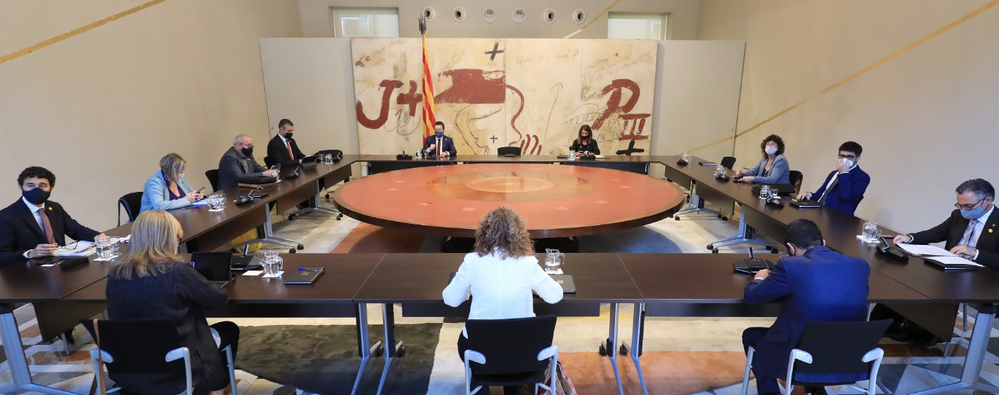- The VP and Minister of Economy and Finance, Pere Aragonès, will replace President Torra
- Government spokesperson Meritxell Budó said the resolution was signed by all of the ministers “to underscore the exceptional nature of the decision, taken at a time when Catalan institutions are facing political persecution”
- The Executive Council also adopted a new decree-law on tax measures to mitigate the effects of the Covid-19 pandemic and approved a special programme to reinforce the Catalan Health Service with additional staff

In a meeting held today, the Executive Council adopted a decree to replace the president of the Government of Catalonia. Under the decree, the Vice-President and Minister of Economy and Finance will replace and exercise the powers of the president of the Government of Catalonia, subject to the limitations that apply to a replacement and to a caretaker government.
In a press briefing following the Executive Council meeting, the Minister of the Presidency and government spokesperson, Meritxell Budó, said the resolution had been signed by all of the government ministers “to underscore the exceptional nature of the decision, taken at a time when Catalan institutions are facing political persecution”.
Budó told reporters: “The disqualification of President Quim Torra is yet another political decision, devoid of justice and proportionality, and we’re confident that, as we’ve seen on other occasions, European courts will rule in the president’s favour. […] The exercise of freedom of expression and opinion is a fundamental right that cannot be violated under any circumstances, much less when the person exercising that right is a democratically elected institutional representative.” As a mark of “respect and solidarity”, the seat that President Torra has occupied at meetings of the Executive Council was not used today and will remain empty for the rest of the legislature.
If enforcement of the relevant judgement issued by the Civil and Criminal Chamber of the High Court of Justice of Catalonia is suspended, the decree adopted today will cease to have effect and President Torra will be reinstated.
In response to a question on how President Torra’s removal from office is likely to affect the negotiating table with the Spanish government, Budó said the judgements issued by the Supreme Court “do nothing to facilitate dialogue”. At the same time, she reiterated that the Catalan government is ready to sit down at the negotiating table if there is “a real determination to resolve the political conflict”. She said this means “addressing Catalonia’s right to self-determination and passing an amnesty law to put an end to repression”.
Catalan government adopts new decree-law on tax measures to mitigate effects of coronavirus pandemic
Following the publication of the decree on the replacement of the president in the Official Journal of the Government of Catalonia, a decree-law on urgent tax measures was adopted by the Executive Council in its regular weekly meeting. The decree-law sets out a series of measures to complement those approved in the spring, at the height of the pandemic. The measures are aimed at meeting the needs of citizens in the context of an exceptional economic situation, marked by a recovery that will be slower, more uncertain and more asymmetrical than was anticipated five months ago.
Executive Council approves special plan for Catalan Health Service to tackle consequences of Covid-19
The Executive Council also approved a special plan for the Catalan Health Service to tackle the consequences of the Covid-19 pandemic. The aim is to hire additional staff to work in areas and regions of the health service that have been assigned new responsibilities and are dealing with a higher level of activity due to the pandemic.
In reference to an announced agreement between the Community of Madrid and the Spanish Ministry of Health, under which restrictive measures will be applied in any Spanish city with a population of over 100,000 when certain thresholds related to Covid-19 are exceeded, Budó said the government does not anticipate reaching an incidence of over 500 cases per 100,000 population or a PCR positivity rate above 10%.
She said the Catalan government does not agree that these are the appropriate parameters or accept that a “one-size-fits-all approach” is the best way to tackle any outbreaks. “What we’re asking is that autonomous communities with high positivity rates take the necessary measures without delay,” she said.
Executive Council approves extension of deadline for land purchase
The Executive Council approved the extension of a deadline for the purchase of land included in the Urban Master Plan of the Vila-seca and Salou Recreational and Tourism Centre. The Catalan Land Institute (INCASÒL) and Hard Rock International will now have until 15 December to meet the requirements set out in a resolution adopted by the Executive Council on 3 March.
The private contract concerns Hard Rock International’s purchase of land from INCASÒL. Hard Rock International requested this second extension of the deadline for closing the deal in view of the economic impact that the coronavirus pandemic is having on the US company and its subsidiaries.
Jaume Vicens Vives 2020 awards for teaching quality
The Executive Council also adopted a resolution to grant Jaume Vicens Vives 2020 awards for teaching quality to a number of university lecturers and projects carried out by Catalan universities.